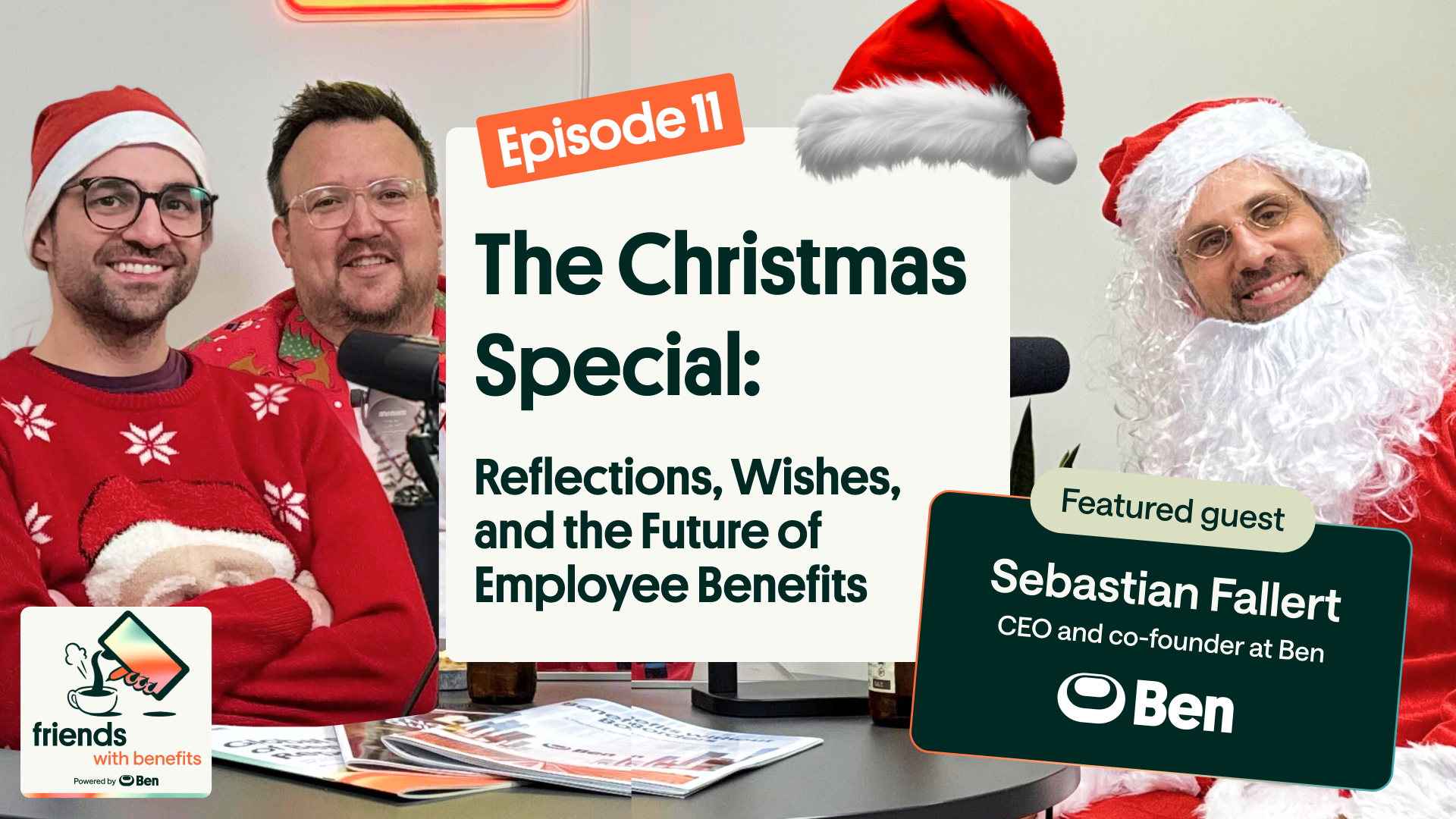The One With Christina from Cohesity: How Benchmarking Broke Benefits (and Why Flexibility Can Fix Them)
About the guest

Christina Alliak is the Director of Benefits at Cohesity, leading global reward, wellbeing, and recognition strategy across a fast-growing, high-tech organisation. With nearly two decades of HR experience spanning Cisco, BCG, Deloitte, and Celonis, she’s known for pairing analytical rigour with genuine empathy — designing benefits that work in practice, not just on paper.A self-described “human performance neuroscience geek,” Christina blends data, design, and behavioural insight to create programs that actually help people thrive. She’s passionate about simplifying complexity, challenging the benchmarking herd mentality, and pushing for true flexibility — where systems, tech, and people all work in sync.

Summary
{spacer-24}
In this episode, Christina Alliak, Director of Benefits at Cohesity, joins Carl and David to explore how the industry got tangled up in comparison reports and legacy systems, and what it’ll take to build something better. Together, they dig into the messy middle between aspiration and reality — from flexible benefits dreams and ancient insurer tech to admin overload, prevention vs. intervention, and the one mistake that taught Christina her biggest lesson about communication.
{spacer-32}
Topics on the table:
- Why benchmarking is overhyped — and often lazy decision-making
- The admin iceberg beneath every “simple” benefit
- How AI could fix the grunt work (but break the learning curve)
- Flexibility as the holy grail — and why it’s still so hard
- Prevention vs. intervention: turning off the tap
- Why HR needs product thinking and consumer-grade UX
- The problem with “best practice”
- The hidden cost of outdated providers and missing standards
- Benefit confession: when the comms kill a great idea
{spacer-32}
03:30 — AI Everywhere (and the Boring Stuff It Should Fix)
{spacer-12}
"AI gives us so much capability to enhance really manual, boring processes. A huge chunk of what my team does is low-value — digesting data, formatting, updating spreadsheets. If we can automate that, that’s amazing."

{spacer-32}
05:00 — The Catch: How Do You Learn Without the Boring Work?
{spacer-12}
“The problem is, you learn on the job through those boring tasks. If we automate all of that low-value work, how are we going to teach the new generation of professionals? Maybe those jobs won’t exist — and maybe that’s fine — but it does make you wonder what the next path looks like.”

{spacer-32}
08:00 — Benchmarking Is Overrated
{spacer-12}
“The role of benchmarking is overexaggerated. It gives you a data point, but that’s all it is. I’ve had companies pay consultants for reports that said exactly what I already knew. It’s not strategy — it’s validation theatre.”

{spacer-12}
“You should look inward, not outward. I hate this notion of peering over the fence to see what others are up to — it just keeps everyone in the same place.”

{spacer-32}
10:00 — The Dream of Open Data
{spacer-12}
“Why isn’t there a place where, as an employer, I can go and see anonymised benefits data? With AI, we could pull and encrypt that data safely. Imagine open-source benchmarking: every company plugs in, and you can see trends instantly. Benefits are 80/20 — 80% the same, 20% creative. That’s the space we should focus on.”

{spacer-32}
13:00 — The Trap of Ease and Expectation
{spacer-12}
"Benchmarking is easy because you outsource decision-making to consultants. Real insight takes time — you have to talk to your people, listen to their challenges. But the second you ask, expectations shoot up, and then they expect change straight away. Sometimes, you just don’t have the budget or the bandwidth.”

{spacer-32}
14:30 — Medical Inflation and the Benchmark Box
{spacer-12}
"Medical costs are rising every year, but benchmarks don’t change. I’ll give you India as an example — the level of coverage hasn’t moved, but premiums have. Everyone’s still guided by the benchmark, so we’re not doing right by the employee. We’re just staying ‘in line.’”

{spacer-12}
“A benchmark report is a ‘that’ll do’ document. Check the box, move on.”

{spacer-32}
18:00 — Prevention Beats Intervention
{spacer-12}
"Everyone’s bailing out the bathwater — nobody’s turning off the tap. It’s wild that we keep spending more on medical interventions and still underinvest in prevention.”

{spacer-12}
"It’s so true. Companies treat symptoms, not causes. It’s like healthcare systems everywhere — intervention over prevention. Benchmarking doesn’t fix that.”

{spacer-32}
20:00 — Flexibility: The Holy Grail
{spacer-12}
"Flexibility is the holy grail, but it’s an operational nightmare. Every country has its own tax rules, government reporting, payroll timing. You want employees to make choices anytime, not once a year — but that means HR has to constantly update data. It’s chaos.”

{spacer-32}
23:00 — The Dream Model
{spacer-12}
"Ultimate flexibility? Give people a pot of money and let them choose — with sensible guardrails for pensions, life insurance, maybe income protection. The rest? Let people decide what matters.”

{spacer-32}
27:00 — The Marketplace Vision
{spacer-12}
"Why can’t medical insurance work like CompareTheMarket? We can pool risk for cars but not for health. Group insurance makes sense for some things, but there’s no reason why an individual marketplace couldn’t exist for the rest.”

{spacer-32}
29:00 — HR Tech, Product Thinking, and Delight
{spacer-12}
"We should be talking about ‘delight’ in HR — just like product teams at Google do. That’s how we make people feel supported.”

{spacer-32}
31:00 — The Hidden Cost of Admin
{spacer-12}
"Lack of automation is still killing us. Ten years ago, we were doing SFTP file transfers — and we’re still doing them. Some insurers’ systems are ancient; I once waited a month for a reissued invoice.”

{spacer-32}
34:00 — Standards, APIs, and Stalemate
{spacer-12}
"There’s no standard. Everyone’s protecting their patch. Providers won’t change their processes for one client — so nothing moves.”

{spacer-12}
“It’s like open banking — nobody moved until regulation forced them to. Maybe benefits needs that moment too.”
.png)
{spacer-32}
41:00 — What AI Needs to Work
{spacer-12}
"AI can only work when you have a clear knowledge base and clear processes — otherwise, you’re just automating confusion faster. And I don’t think we always know what our processes even are.”

{spacer-32}
43:00 — The Future (and AI Burnout)
{spacer-12}
"As long as humans are working, benefits will be necessary. But who knows — maybe one day AIs will need benefits too. My friend said some of these models are already showing emotion… maybe burnout’s next.”

{spacer-32}
Listen to the podcast on Spotify, Youtube, Apple Podcast.
.png)


